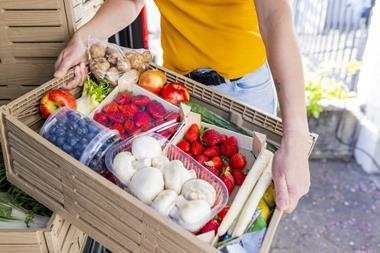About £800m was spent on vegetarian products last year, according to the Vegetarian Society strong evidence that the unflattering stereotypes of veggie products in the past have been firmly cast to the darkest depths of the freezer cabinet.
The figures show that the value of today’s market for veggie foods has more than doubled from the £333m the society says it was worth a decade ago.
So what’s driving this growth spurt, and should the c-store retailer be taking more than just a token interest in it? The answer to the latter is a big yes. While many people have adopted a veggie lifestyle for ethical reasons, a growing number are doing so for the perceived health benefits of a meat-free, veg-packed diet that’s lower in saturated fat.
“The number of committed vegetarians has actually remained fairly stable over the past 10 years,” says the Vegetarian Society’s Su Taylor. “The real growth area is in meat reducers people who haven’t given up meat completely but who are making a conscious effort to eat less of it. The figure varies a lot depending on how you measure it, but includes up to a third of the population.”
It’s a trend that independent retailer Des Barr, from Sinclair News, Paisley, Renfrewshire, attests to. “Even up here, demand for vegetarian foods is increasing as people opt for healthier products,” he says. “I was recently looking to introduce a new range of sausages and bacon, but when I ran the idea past my customers many of them said they were looking to reduce the amount of meat they ate for health reasons.”
The rise of the “flexitarians” non-vegetarians who forego meat on an occasional basis has also been helped by the economic slowdown. Despite becoming increasingly sophisticated, vegetarian products are still generally cheaper than their meatier counterparts, so shoppers get more bangers for their buck when they opt to go meat-free.
One retailer who has witnessed the trend first-hand is Julie Gerrity of Spar Emlyn, Newcastle. In the past two months she has sold more than 10 cases of Quorn burgers, five of Quorn mince, six of chicken and 11 of sausages.
“Vegetarian products are cheaper and that’s why they are often the choice for hard-up students,” Julie says. “Another reason for their growing popularity is convenience. Most of our vegetarian foods are frozen, which makes them so much more convenient to cook with when you are short of time. If you wanted to make a chicken curry you’d have to plan in advance and either buy chicken fresh or defrost it, but the beauty of Quorn ‘chicken’ is that you can cook it from frozen.”
Frozen products still account for the lion’s share of the category spend grew by 5% in this sub-sector, which also gained more than 480,000 new consumers last year, according to Kantar Worldpanel data for the year to December 2009.
However, with space in the freezer tight, manufacturers warn that it should be used wisely. Smaller stores could cover their bases by stocking the best-selling lines, which are sausages, mince and burgers, while larger stores could be more adventurous, says Tivall UK country manager Justin Dobson.
And small stores that cannot spare the freezer space but which are still keen to get in on the veggie action can always look at other areas. Julie has already enjoyed success by expanding her food-to-go section with meat substitutes. “We sell a soya sausage roll that is really popular,” she says.
In fact, it is doing so well that she is urging manufacturers to further develop the area. “I’m keen to boost my vegetarian offer, but while there are lots of frozen vegetarian products there aren’t many fresh ready-to-eat ones. I would like to see more of these types of things on offer. That’s definitely an area that manufacturers should be investing in.”
In return, manufacturers would like retailers to invest in better promotion and signage.
“Promotion is critical to educate consumers,” says the Vegetarian Resource Group. “Signage attracts attention to the products, while recipes, demonstrations and sampling encourage use.
“Temporary price specials also help motivate trial by those who are new to vegetarian foods, although they also have a loyal following that is much less price sensitive,” it adds.
While sampling may be harder for a small store to carry off, National Vegetarian Week which runs from May 24 to 30 gives retailers an opportunity to test the waters. Stores can order free pos material from the Vegetarian Society to drive awareness and trial, for example.
So, while we’re not suggesting that you rush out and load up on lentils at the cash and carry, a few choice products such as veggie burgers and sausages might give your store a healthy lift.































No comments yet